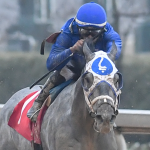
Preakness Quick Sheet: Get to Know the 2021 Preakness Horses

Jerry Bailey won seven Eclipse Awards, 15 Breeders' Cup races and six Triple Crown events during his Hall of Fame riding career, yet he has no hesitation in narrowing down the biggest upset of his career.
For good reason: Bailey and the French raider Arcangues are responsible for one of racing's all-time biggest upsets, and it came in the richest race at the world at the time, the $3 million Breeders' Cup Classic in 1993.
November 6 will mark the 25th anniversary of Arcangues' stunning triumph by two lengths at odds so high the tote board at Santa Anita Park could not encapsulate them, reading 99-to-1. In fact, he was 133.60-to-1.
"I think that one would stand out in anyone's career," Bailey said this week as he sharpens up on the contenders for the 2018 Breeders' Cup World Championships in his role as an analyst for NBC Sports.
The difference in accessibility to race replays and detailed form information between today and 25 years ago is one aspect that Bailey focused on in detailing his unique experience on Arcangues, a horse he had never seen before he walked into the paddock that day. Bailey also is pretty sure he had never previously met Arcangues's trainer, Andre Fabre, and could not find him in the packed paddock.

"His assistant gave me a leg up and I asked the guy about the horse because a lot of times the assistant will know the horse as much as the trainer, but he didn't speak any English and he was talking to me in French and I understood nothing," said Bailey, who was only available for the mount because Sea Hero, whom he had guided to victories in that year's Kentucky Derby and Travers Stakes, had sustained a season-ending injury. "Finally, when we were starting to go through the tunnel out onto the track and I heard this voice, 'Jerry, Jerry!' It was Andre Fabre, and I thought 'Phew, finally he is going to tell me something,' but he got up to me and just said, 'Good luck.' I went into that race blind.
"Today, you can pull up a horse's replays and know something more than just what is in the PPs in the Daily Racing Form, which is still not that much for a European horse. Back then, doing your homework for a horse like that was pretty much impossible."
By 1993, Fabre was already well established as a leading international trainer. In the race immediately preceding the Classic, he had started five of the 14 horses in the Breeders' Cup Turf, only to come up empty with nothing better than an eighth-place-finish.
A quarter century later, Fabre maintains that Arcangues's Classic bid was hardly an afterthought. He was a Group 1 winner in France that spring at the Classic's mile-and-a-quarter distance.
"He was a very good horse, a Group 1 winner in France," Fabre said. "He was a backward type, but a hell of a horse. I still have the opinion that there is not that much difference between grass and dirt form."
Fabre did have some evidence in his back pocket that informed the decision to come to the states with Daniel Wildenstein's homebred Arcangues.
"About a month before, I worked him on the dirt," Fabre said. "His owner, Mr. Wildenstein, had a dirt track at his facility [in France] and Arcangues worked with some talented horses and dominated them.
"Regardless of price [on the toteboard], it was a very good horse and a very good owner. A great memory!"
With no discernible instructions, Bailey drew on his experience and worked out his own game plan.
"He was a European horse, so I figured he would come from behind and I'd just go to the fence, try to save ground and maybe I could get a piece of it," Bailey said. "I've always been a believer that horses run best the way that they want to run. If you have no preconceived idea, and this was the definition of having no preconceived idea, then you pretty much let them run how they want to. He just had a lot more run in him than I could have ever expected."